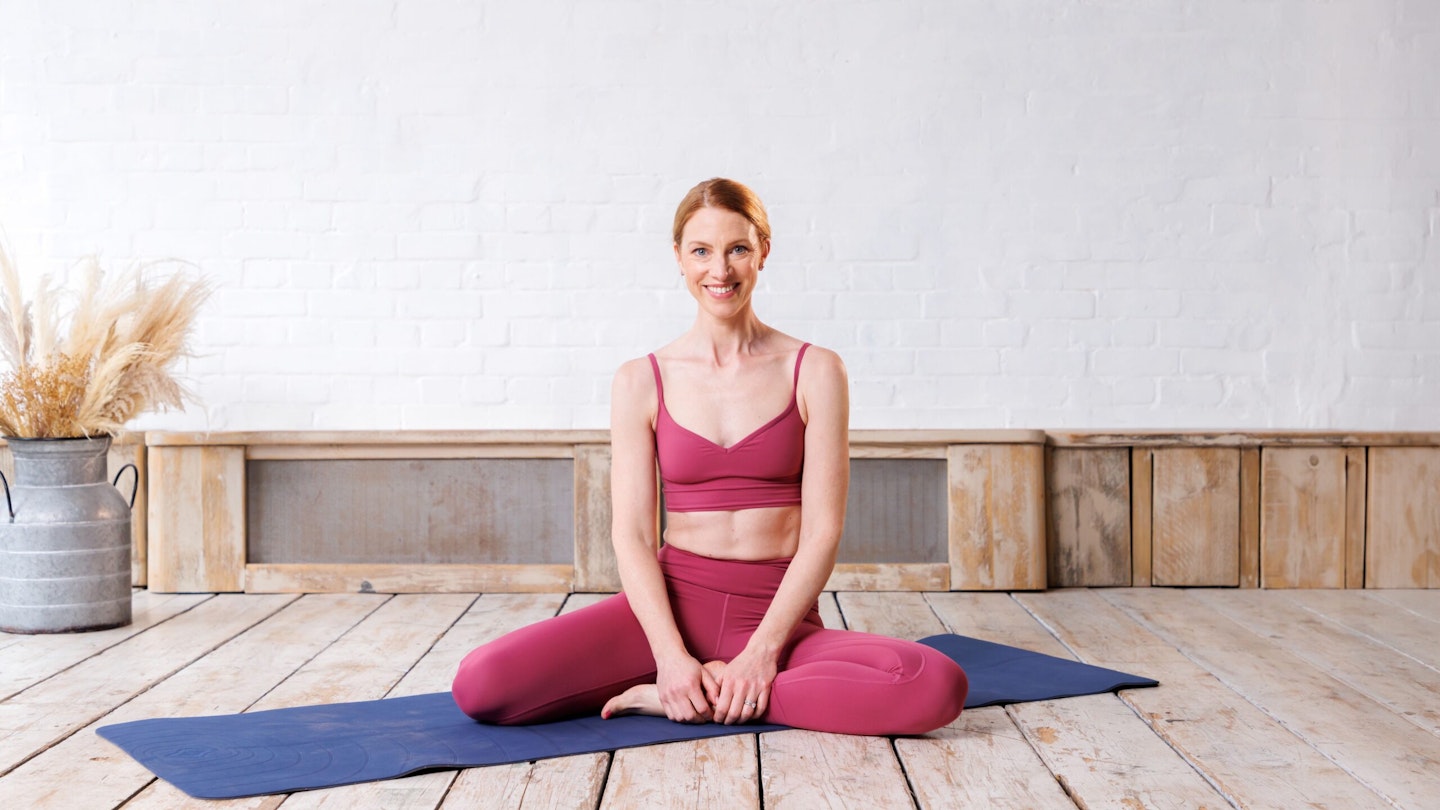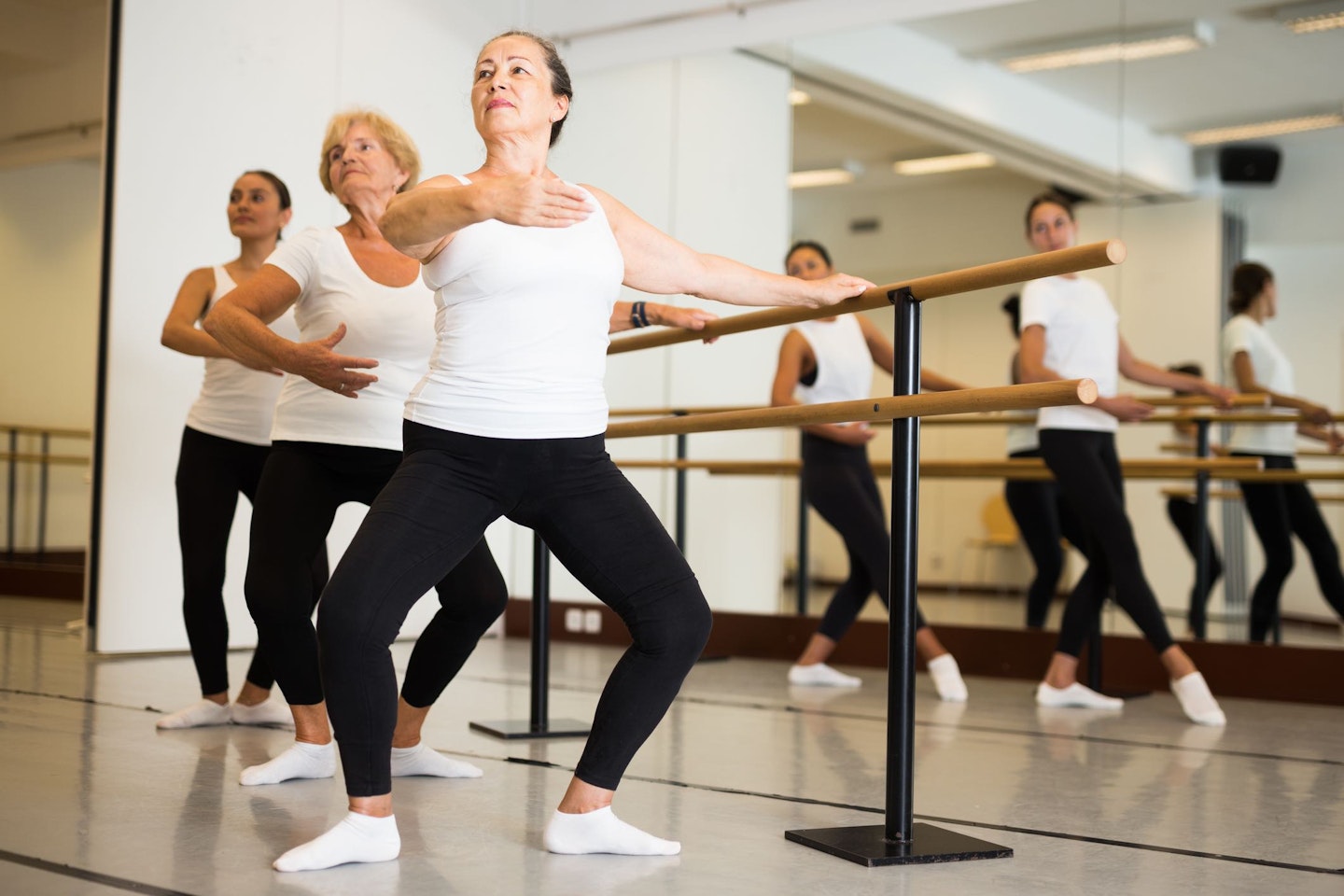We talk to ballet teacher Sarah Aspinall to find out the mental and physical benefits of ballet for older adults.
Maybe you did ballet as a child, and the phrase ‘good toes, naughty toes’ has your feet instinctively twitching. Or maybe you’ve never done ballet at all but admire a dancer’s grace and ability. Whatever your experience, it’s never too late to learn something new, or to reignite a passion. Ballet is an incredible form of fitness for older adults, focusing on movement, flexibility and strength.
The Queen is a big fan of ballet, serving as Vice-Patron of the Royal Academy of Dance. She enjoys Silver Swans ballet classes, as does their ambassador, Angela Rippon. The Queen knows only too well how important it is to do strengthening exercises as we age, and ballet plays a strong part in that. Her Majesty first became a supporter of The Royal Osteoporosis Society in 1994, when her mother died because of the disease, and she later become a patron in 1997.
Strengthening exercises help preserve bone density – something that can decline as we age – which helps us to stay stronger, move better, and can prevent falls and fractures. Regular exercise also strengthens our brain – creating neural pathways that help keep our brain in top condition. In fact, The Alzheimer’s society report that exercise can reduce the risk of dementia by 28%, and the risk of developing Alzheimer’s by up to 45%.
Yours spoke to Sarah Aspinall, a ballet teacher who specialises in adult classes, to find out more.

What are the physical benefits of ballet for people over 50?
“Two of the top issues that people come to me with are balance and flexibility,” Sarah says. “Aches and pains start to happen because of hormonal changes, and people discount flexibility until those aches appear and they can feel the joints getting stiffer.
“It's vital to add some flexibility work into your routine, and ballet gives that as a natural part of the movement. It helps to protect mobility and our independence as we age, because the stretching part of ballet, which is quite unique to this form of movement, keeps the muscles strong, flexible and healthy. Without that, muscles can start to get tight and short and that then puts us at risk of joint pain strains and muscle damage.”
Ballet classes are also a great way to improve balance for several reasons, including working the legs and improving awareness of how our bodies move, as Sarah points out:
“We do a lot of work on the core and the legs, which is primarily what's responsible for balance, and because ballet has this focus to help improve balance and coordination, it also fosters an increased body awareness.
Mind body connection is hugely increased, which helps older women reconnect back into their changing bodies.”
What are the psychological benefits of ballet as an adult?
“There's been research done on why dance is particularly beneficial for the brain,” Sarah tells us. “And that's partly because it includes elements of balance but it also seems to be that the challenge of coordination with music and the movement patterns of ballet are particularly protective against cognitive decline. So, it has quite a profound anti-ageing effect on the brain.”
It’s no secret that any exercise is good for your mental health, releasing feel-good endorphins and boosting serotonin, lifting our mood. But Aspinall adds that the concentration required in ballet, as well as the beautiful music, offers a unique combination of relaxation and focus:
“Because it's a form of artistry, one of the things that a lot of women say is that they come into class on a Monday morning feeling stressed with all the challenges they've got going on, but you've got to focus.
You can't do a ballet fitness class and be writing a shopping list in your head. You've got to connect with your body, but the music also helps people to express their emotions, so they start releasing their stresses as well, and just feel better.”
Is ballet a form of strength training?
The NHS recommends that all older adults do at least 2 sessions of strength-based activity per week. This is especially important for women during menopause, when bone density decreases due to declining oestrogen levels.

Strength training can take many forms and doesn’t just mean lifting weights in the gym. You might learn how to use dumbbells or resistance bands, or you might use your own bodyweight to build strength. As well as teaching ballet classes in person, Sarah also offers an online class programme, where exercises can incorporate dumbbells but, she also focuses on body movement to make you stronger:
“With ballet you are having to use the big muscle groups of the legs and core, so it really helps to strengthen the body. In my online programme we also have a strengthening series, so we are also using dumbbells with ballet moves as well.
It’s all low impact – so it’s kind to the knees and other joints, but it’s a good idea to incorporate some more high impact cardio if you’re able to. However, you can still strengthen muscles in a low impact way.”
It’s not too late and you are not too old!
We like to seize the day here at Yours, and we firmly believe that it’s never too late to try something new. Sarah shares our belief, and she encourages anyone to try ballet, no matter their age or dance experience:
“I have a mix of clients. Some people did ballet when they were younger, and stopped, so it’s a real joy for them to come back to it. Others are complete beginners. What is so beneficial though is that you're really challenging your brain again.
It’s important to find some self-compassion and realise this is a skill, not a talent. It’s something that needs to be learned, and that’s brilliant for your brain. At the same time your body is adapting to it and learning something new as well.”
What if I don’t want to exercise for hours on end?
Then don’t! The beauty of incorporating more activity into your life when you’re older is that you can do it on your terms – if you want to take an hour-long walk, then go ahead but likewise, if you want to break your active minutes up into more manageable chunks, then that’s fine too.
Many in-person classes, whether that’s a gym class, yoga or ballet, will be about an hour. But there are also much shorter offerings out there, like Sarah’s online programme. Shorter workouts are easier to fit into our lifestyle and – personally speaking – I find them more empowering and uplifting, because they feel achievable. Some days I have time to do 15 minutes, other days I might do two or even three short workouts either back-to-back or broken up with other activity (such as household chores, or meeting friends) in between.
“Short bite sized workouts are highly effective, but totally doable,” Sarah says. “And what I want women to be able to do is to reap the rewards from this form of movement. If you ask people to do an hour a day, it just doesn't happen. Under 15 minutes every day does work because it's doable, then you're able to be consistent, then you start seeing changes which of course is the reward which then makes you want to continue with it.
“I do a lot of mindset work with my online community as well, because we all go through that roller coaster where we think we’ve not done it for a while, we’ve had pizza, or wine, so I’ve undone all the good work. And of course that is nonsense. But it's getting people back into it and changing their fitness mindset. So that if life does get in the way which inevitably it will do, that's fine.”
You might also like to watch or listen to Sarah’s TedX talk from 2023, where she discusses why movement helps us to connect to other people.
Sarah Aspinall is a Royal Academy of Dance trained ballet teacher. She runs Breaking Ballet, an online ballet school for over 18,000 adults across 22 countries. She also teaches ballet classes in person.
